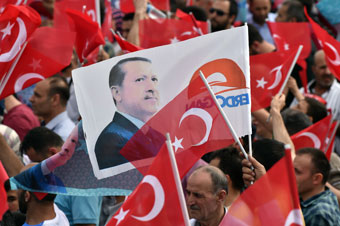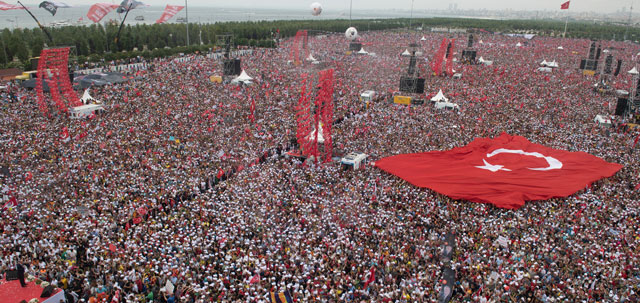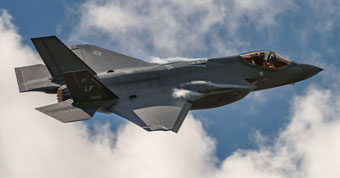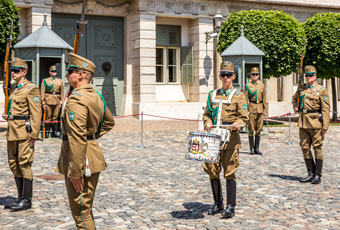Q & A: Edelman on Erdoğan
Senior Fellow Eric Edelman, a former ambassador to Turkey, on the re-election of Turkey's autocratic president
On June 24, 2018, President Recep Tayyip Erdoğan of Turkey continued his consolidation of power with a victory over opposition candidate Muharrem İnce in the nation's second presidential election decided by direct popular vote. Eric Edelman, a Miller Center senior fellow, served as U.S. ambassador to Turkey from July 2003 to June 2005, during a period of high tension following the U.S. invasion of Iraq. Edelman offered his thoughts on the election in a live conversation on Facebook. Below is a recording and edited transcript of the interview.
Q: Before we get into the election results, explain why Turkey is a country we should be paying attention to.
Edelman: A number of years ago, Paul Kennedy—the author of The Rise and Fall of the Great Powers—wrote a book with a bunch of colleagues called The Pivotal States. It selected a group of states around the world who were crucial to the development of international affairs. And Turkey was one of those pivotal states.
[Turkey] is absolutely crucial to U.S. interests in Europe and the Middle East, and in Eurasia more broadly.
And really, just a look at the map. Turkey literally joins Europe and Asia. When you go across the bridge from Anatolia to Istanbul, it says, “Welcome to Europe.” If you go the other way, it says, “Welcome to Asia.” It’s been a hotbed of conflict since the ancient world.
It is the transit point for a very large number of refugees—of course from Syria, but also from Iraq, from Afghanistan into Europe. And actually, some migrants from Sub-Saharan Africa sometimes make their way over to Turkey as well. So whether it's the conflict in Syria, the future of Iraq, the Iran nuclear program, Ukraine—because it is a Black Sea state, its neighbors are Russia and Ukraine—it is absolutely crucial to U.S. interests in Europe and the Middle East, and in Eurasia more broadly.
Q: President Erdoğan has been in power since 2003. There was a failed coup attempt in 2016 leading to a state of emergency. Tell us where the election fits in the narrative. What does that future look like now that Erdoğan has won?
Edelman: Turkey has always been what Dean Acheson called [in 1947 before a closed hearing of the Senate Foreign Relations Committee] an "imperfect democracy." It sent forces to fight with us in the Korean War. In 1952, it joined NATO. Our relationship with Turkey has been one for which we sought over time to help make it more of a truly democratic state. And after 9/11, people became particularly concerned about Turkey as a democratic state because it's one of the few examples of a modern democracy that also happens to be a majority Muslim country.
The AK party, which is President Erdoğan's party, was first elected to office in November 2002 in the wake of a devastating economic crisis that left the Turkish economy in terrible shape. But [Erdoğan himself] was actually at that point under a ban for having recited a poem that was regarded by the authorities as a sort of provocation. And he was only able to actually become prime minister in the spring of 2003, after the ban was lifted.
So from 2003 to 2014, for a continuous period, he was prime minister of Turkey and his party governed during that time without any coalition partner, which has been very rare in the Turkish political experience since multiparty democracy began in 1950. In 2014, as part of a series of legislative and constitutional changes that he and his party engineered, he was elected a president in the first popular election for president that Turkey had in its history—previously, the presidency had been largely ceremonial and chosen by the parliament—against a backdrop of increasing authoritarianism.

[There was] a series of conspiracy trials, whose origins are murky but whose results were the imprisonment of large numbers of military officers, but also civil society activists and increasing concern by groups like Freedom House, about the retrograde or retrocession of democracy in Turkey. In 2017, a year after the coup attempt, Erdoğan was able to push through in a popular referendum changes he’d talked about for some time to create an executive presidency, [which were scheduled to go] into effect after the next presidential election. That was at that point scheduled for 2019
He decided to have the election sooner rather than later, before all the potential consequences of an economic downturn hit.
This past spring, Erdoğan decided to bring forward the election both for the presidency and the parliament, which normally don't occur at the same time, because he was fearful that the economy was beginning to head south. The Turkish Lira has depreciated about 20 percent since January. There seems to be a credit bubble. There's a worsening balance of payments account, the current account deficit is growing. So he decided to have the election sooner rather than later, before all the potential consequences of an economic downturn hit. He thought calling it early would also wrong foot opposition by not giving them a chance to organize and prepare. That may have been a bit of a miscalculation because in the end, his opponent from the People's Republican Party, the main opposition party, actually ran very brisk campaign and had some very big crowds. But at the end of the day, there really wasn't much improvement in the opposition vote.

Erdoğan’s vote was about a little bit higher than this vote four years ago. I think he had 51 percent then I think he had 52.6 in the final count on Sunday. That might sound like a pretty impressive victory, but really, it's not. If you look at the OSCE [Organization for Security and Cooperation in Europe] monitoring report, this was not a free and fair election. The media was heavily tilted: about 90 percent of the media coverage went to Erdoğan; about 10 percent to his four or five rivals. There were some irregularities in the voting, much as there were in the referendum a year ago. The OSCE didn't make a judgment about whether those irregularities were sufficient to change the outcome, and [opposition candidate Muharrem] İnce in his concession speech, said yes, they stole votes, but not enough to make a difference. [We don’t know] whether İnce really believes that or whether he is choosing not to a challenge the election because Erdoğan and his colleagues said on election night that anyone who challenges these results is committing treason. It may be that İnce decided that discretion is the better part of valor and better to concede the election today and live to fight another day.
Q: Where do you see things going from here? You mentioned some of the economic issues. It's very interesting to have a democratic system with a leader who appears to be anti-democratic.
Edelman: I think Turkey, unfortunately, is become a leading example of what some political scientists call electoral authoritarianism. There are other examples of this, like Russia and Egypt and a number of other countries for that matter, where the government allow elections, albeit with lots of restrictions, but they govern in a very authoritarian way. And Erdoğan’s understanding of democracy has always been one that Americans used to checks and balances would not really recognize. Essentially his attitude is, I have authority, therefore I can do whatever I want. and I think we're likely to see more of that. There were some some suggestions that Erdoğan might be a kinder, gentler after this election. I don't think that's likely to come to pass.
Q: Is there anything the United States should be doing, thinking, or saying in light of this result?
Edelman: Turkey presents an extremely difficult problem. It's perhaps the most extreme case of a problem that we face in the NATO alliance. NATO was meant to be an alliance of likeminded, liberal—small l—democracies. And increasingly we see, um, what, what Fareed Zakaria calls illiberal democracies emerging throughout the region. Hungary is one example, and it’s not an accident that Orbán, the prime minister of Hungary, was one of the first foreign leaders to call Erdoğan to congratulate him on his victory So it makes for a very difficult a problem for us. And this is not just, I think, a question for the Trump administration.
The reality is, the administration I served, the Bush administration, the Obama administration, the Trump administration have all taken the same attitude towards Turkey despite all the difficulties. And that is that if we just ignore all this and treat Turkey like an ally, eventually they will behave like an ally. And I think we've had enough experience with Erdoğan over the last decade that expecting that to work is just falling into Einstein's famous definition of insanity, which is doing the same thing over and over again and anticipating we’re going to get a different result.
I think we have to become a bit more transactional and drive a hard bargain with them on each individual issue and not think that, well, if we go easy on this one, somehow they'll cut us some slack on some other issue. That just has not worked.

So I think we have to change a little bit the nature of the relationship with Turkey. We have to become a little bit more transactional. Among the other things, Turkey is holding a number of American citizens, dual nationals, or in some cases foreign service nationals who work for our embassies and consulates, in detention, accused of, uh, you know, collaboration and terrorist activity. These are a trumped up, pardon the pun, charges, without any merit. They are purchasing a Russian S-400 air and missile defense system which is not compatible with NATO and that could jeopardize, in fact, imminent transfer of [U.S.] F- 35 aircraft.
So there's a lot of business to be done on a lot of issues, but I think we have to become a bit more transactional and drive a hard bargain with them on each individual issue and not think that, well, if we go easy on this one, somehow they'll cut us some slack on some other issue. That just has not worked.
Q: Sometimes when I look at what's going on in Europe and Asia, it reminds me of the 1930s: a sense of dislocation, a sense of unease, the rise of authoritarian regimes. Is that at all a legitimate fear or am I overreacting?
Edelman: I think it was Mark Twain who said history doesn't repeat itself, but sometimes it rhymes. There are very worrisome echoes of the 1930s, I think. You do have the rise of these authoritarian governments, the rise of nationalist and populist movements.

The European Union was specifically intended to overcome those kinds of forces that had twice in the 20th century, one Europe into incredibly violent, destructive wars that laid waste to the continent. The European Union itself is now crisis in part because of the rise of these nationalist and populist movements, in part driven by mistakes of the EU itself that have led to things like the Brexit phenomenon.
There are some things that are different. A lot of this is occurring because of the unequal distribution of economic gains from globalization, from an enormous rise in migration, both from Sub-Saharan Africa, but also the broader Middle East all the way to Afghanistan, with dislocation that's been created in those areas. And you also have a revisionist power in Europe, Russia, which is questioning the security order and seems [willing] to overturn that order when it's in its interest to do so as it did in Georgia in 2008 and the Ukraine in 2014.
The other thing is you've got the rise of economic nationalism as well as political nationalism, a potential for a trade war that we are in no small part responsible for because the Trump administration's policies
All of this is a pretty toxic stew, and there's potential for worse to come.
